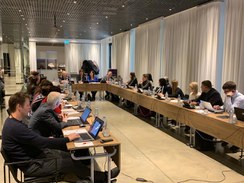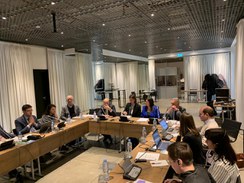20-22 November 2019 | Regional workshop to increase the use and public accessibility of air quality data
The EEA, with support from the Norwegian Institute for Air Research (NILU) and 4sfera and in cooperation with national authorities, is evaluating the status of air quality monitoring and the use of air quality data in the six Eastern Partnership countries (Armenia, Azerbaijan, Belarus, Georgia, Moldova and Ukraine). The experts shared EU/EEA examples of air quality monitoring with the aim of increasing the use and public accessibility of air quality data.
The 2019 ‘Regional workshop on air quality monitoring and reporting’ was organised in cooperation with the Ministry of Environmental Protection and Agriculture of Georgia. It was held in Tbilisi from 20 to 22 November 2019. The workshop delivered hands-on training on air quality data management, processing and reporting. This is in line with international commitments related to targets on capacity building, technology and systemic issues of Sustainable Development Goal (SDG) 17: ‘Strengthen the means of implementation and revitalize the global partnership for sustainable development’.
The very first results from this exercise are already visible, as Georgia has been automatically reporting up-to-date data on air quality to the EEA’s European Air Quality Index on a voluntary basis since April 2019. The data can be accessed through the European Air Quality Index. Data presented on the map are linked to Georgia’s Air Quality Portal.
This workshop, which is part of ongoing EU-funded technical assistance, enhances institutional capacity in the use of air quality data and in providing online access to it and contributes to sound environmental governance. Reliable air quality data enable policymakers to take targeted action and show systemic links for policy intervention. Strengthening this capacity will support efforts to improve air quality monitoring and reporting. Poor air quality has considerable economic impacts, increasing medical costs, reducing workers’ productivity, and damaging soil, crops, forests, lakes and rivers.
 |
 |
The event was covered by the Ministry of Energy and Environmental Protection of Ukraine and on Facebook.

